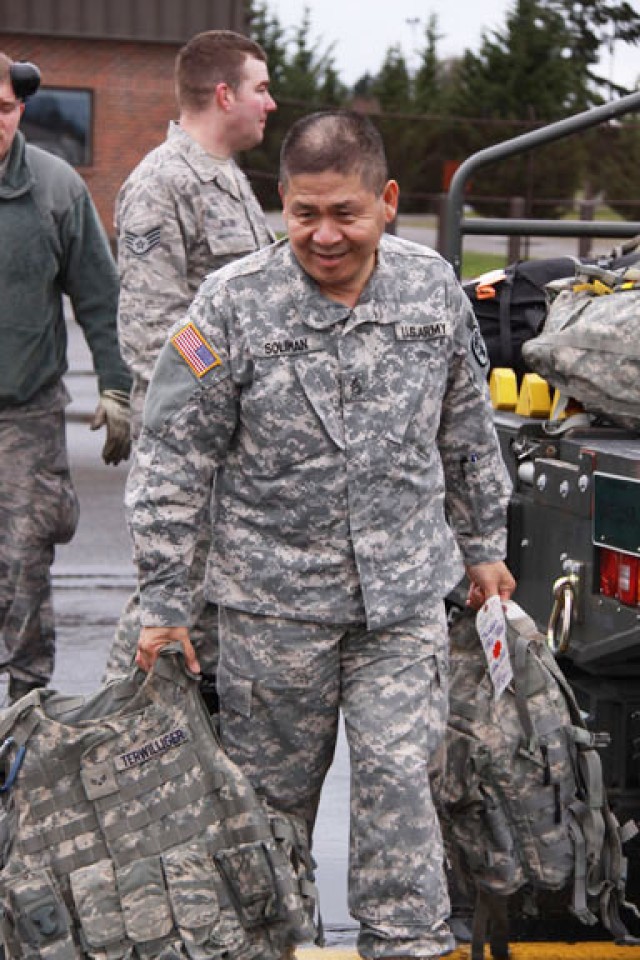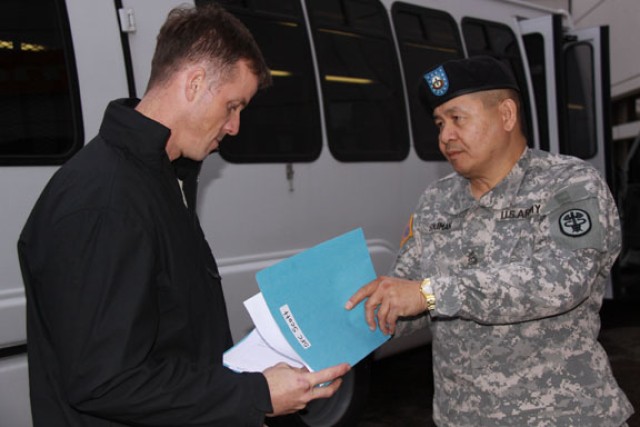JOINT BASE LEWIS-McCHORD, Wash. -- It starts with waiting, on a near-empty tarmac, for the patients to arrive at the next stop on their medical journey. Most of them were medically evacuated from Iraq or Afghanistan, had spent time in Germany and the East coast, and have been on the move for the last 24 hours. Although receiving continuous medical care, many of their lives are tumultuous, as they wait to find out what will happen with their health, careers, and future overall. And the staff with the Warrior Transition Battalion's medical evacuation platoon are just the ones to help.
The nine Soldiers who work in the medevac platoon serve as leadership, advocates, and navigators for incoming wounded, ill or injured Soldiers; they work seven days a week greeting incoming servicemembers who are medically evacuated due to combat wounds, injuries or illnesses incurred downrange, or for behavioral health reasons.
"We're the first contact with them when they touch ground, because they do not know what to expect when they're coming back," said Sgt. 1st Class Kenneth Burks, medevac platoon sergeant. "We're the hub; we handle all of the information they need."
Today, Sgt. 1st Class Noel Soliman is greeting four servicemembers at McChord Field; those patients with greater mobility often fly into the SeaTac airport and are met there.
With Soliman is an air evacuation staff member with Madigan Army Medical Center, as well as a WTB nurse to conduct initial assessments on the patients. The Air Force medevac team on the KC-135 provide a thorough hand-off of their medical conditions, while a social worker later completes the integrated reception to ensure that any immediate behavioral health concerns are accommodated.
All Soldiers are initially assigned to the WTB for 10 days while awaiting permanent assignment to either here or to their units' rear detachments; they may also go directly into inpatient status at Madigan. Although medically evacuated, incoming Warriors must still meet the threshold of requiring six months of complex medical care in order to be assigned to the WTB.
Medevac staff take care of Soldiers during this initial period, ensuring they have lodging and meal cards, that they meet with their nurse case managers and personnel, and that they complete other needed in-processing. "We're the middle person, the mediator for whatever situations or issues you have," said Burks.
The platoon also takes care of Family members, picking them up from the airport, making sure they have a place to stay, and helping with other issues that arise.
While they assist Soldiers through their arrival here, the platoon members also act as unofficial mentors for them to help Soldiers deal with why they've been medically evacuated.
For many, being away from their battle buddies downrange and their deployed mission is a hard mental roadblock to get pass. "We sit down and talk to the Soldiers and explain the reason why they're here. There's only one reason why they're here, and that's to get care. They need to get that to continue their mission," said Sgt. 1st Class Tausala Faamausili, medevac platoon sergeant.
"It's hard to stop doing your normal routine, and say 'Now it's all about me,'" said Burks.
But getting better so they can go back to the fight someday is their current mission, said Faamausili. "Sometimes you have to explain to them, remind them, the reason why they're here."
Easing their transition and getting their feet firmly on the ground for the next phase of their journeys is the underlying aim of the platoon. "It's very difficult to do, but we do it well," Burks said.




Social Sharing